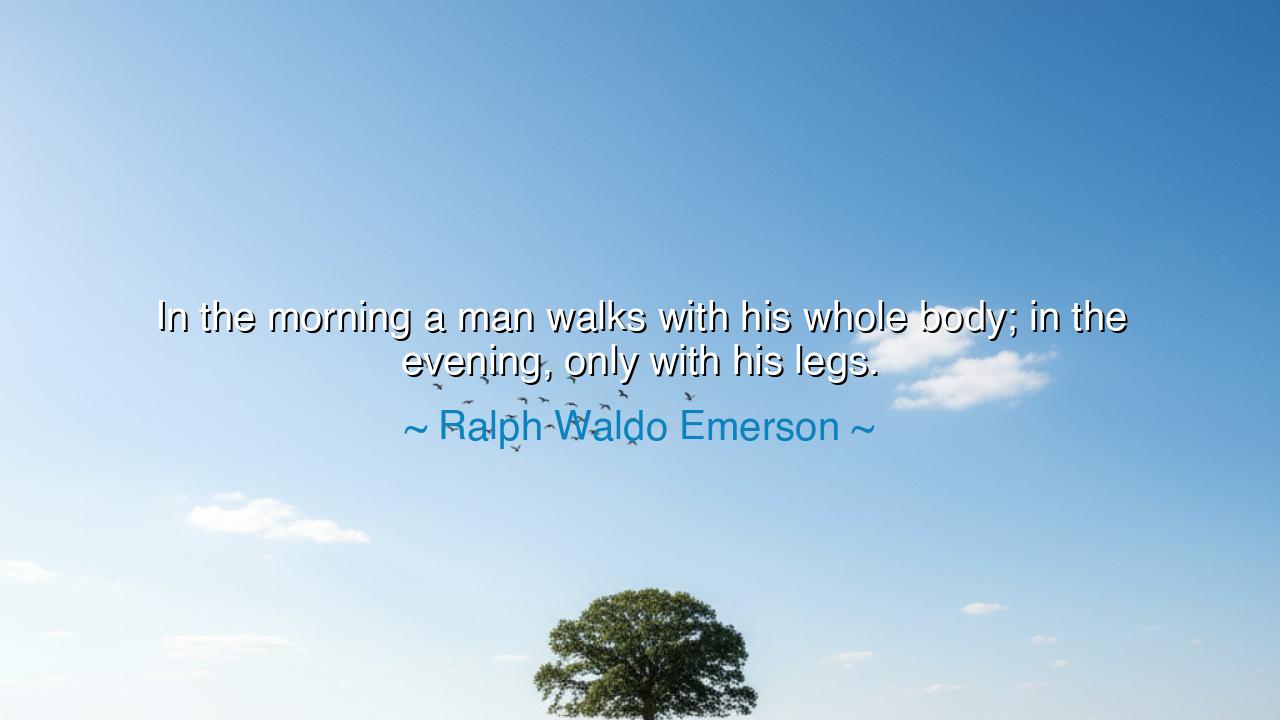
In the morning a man walks with his whole body; in the evening






Ralph Waldo Emerson once declared, “In the morning a man walks with his whole body; in the evening, only with his legs.” At first, his words seem to describe nothing more than the rhythm of the day, but beneath them lies a wisdom both subtle and profound. Emerson, the sage of Concord, saw life not only with the eyes but with the spirit. To him, the morning was not just the first hour of the day—it was the season of freshness, of energy, of wholeness. In that sacred hour, a man rises with his full strength, mind and body aligned, heart awake to possibility. But as the day wanes, the weight of toil presses down, and he moves forward not with the fullness of himself, but with weary limbs carrying him through habit.
The ancients knew this rhythm well. They taught that dawn is the hour of vigor, when the body is renewed by rest and the soul eager for action. The Greeks honored Eos, the goddess of morning, because she carried the promise of renewal. To rise at dawn was to join with creation itself, walking with one’s “whole body”—the unity of strength, purpose, and spirit. By evening, however, the body grows tired, the spirit slackens, and one moves forward only out of necessity, “walking with his legs” alone, stripped of the fullness that the morning once gave.
This truth is not only poetic but deeply practical. Consider the life of Benjamin Franklin, who made it his practice to rise before the sun. In the freshness of the morning, he set his intentions, planned his tasks, and devoted himself to his highest pursuits. By evening, his body, like all bodies, was worn, and the mind less sharp. His wisdom lay in harnessing the early hours, when he could walk “with his whole body,” and giving himself to rest as night descended. Thus Emerson’s saying is a call to order: to use the strength of morning for the labors that matter most, before the dullness of evening claims its due.
History gives us another image in the Roman legions. When they marched at dawn, their steps were vigorous, their shields bright, their spirits burning with discipline. The whole army moved as one body, filled with life. But when they dragged themselves at dusk after long campaigns, they moved only with their legs, weary yet enduring, pressing forward by sheer necessity. Emerson captures in his words this eternal rhythm: vitality belongs to the morning, endurance to the evening.
The emotional weight of Emerson’s wisdom lies in its reminder that we, too, are bound by the cycle of energy and exhaustion. We deceive ourselves when we think we can summon the same spirit at all hours. The morning is a fountain—drink deeply then, for the waters flow strongest. By nightfall, the fountain ebbs, and what remains is not inspiration but persistence. Both are noble, but they are not the same. To know this distinction is to live in harmony with the body, rather than against it.
For the seeker of wisdom, the lesson is clear: give your best to the morning. Let your highest tasks, your deepest prayers, your boldest creations be begun when your whole body and soul are united. Do not squander the dawn in idleness, nor reserve your most sacred work for the evening, when only tired legs remain to carry you. Recognize the rhythm of life, and align your labors with its current, as sailors set their sails to the wind.
What then must we do? Rise with intention. Guard the morning as a treasure, using its strength for the labors of the heart and mind. In the evening, when fatigue settles in, turn to duties that require less fire—habits, rituals, and the quiet tasks of closure. And when night comes, surrender to rest, so that the next morning, once again, you may walk “with your whole body.”
Thus Emerson’s words shine as ancient truth in modern tongue: the morning is for fullness, the evening for endurance. Honor both, but know their difference. For the man who honors the morning lives not only longer, but deeper; not only with his legs, but with his whole being.






AAdministratorAdministrator
Welcome, honored guests. Please leave a comment, we will respond soon